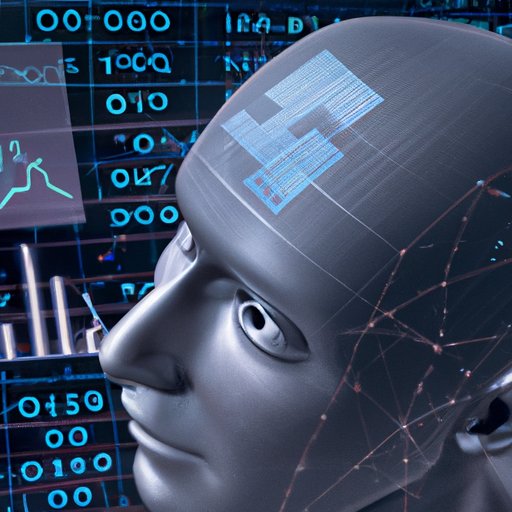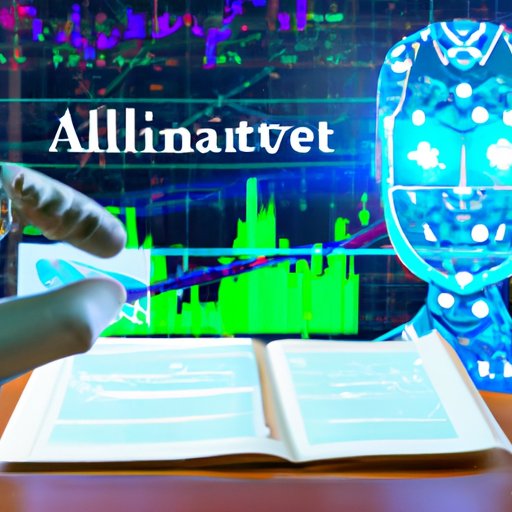Introduction
Artificial Intelligence (AI) has revolutionized the way humans interact with machines and technology. The use of AI in various industries has made it easier for businesses to automate mundane tasks and improve efficiency. AI is now being used to predict a wide range of outcomes, including stock market predictions. In this article, we will explore the potential of AI in predicting stock market trends and examine its accuracy and usefulness.
Examining the Potential of AI in Stock Market Predictions
The role of machine learning in stock market prediction has been studied extensively over the past few decades. Machine learning algorithms are used to analyze large datasets and identify patterns that can be used to make accurate predictions about future stock prices and trends. By leveraging AI technologies such as neural networks and deep learning, stock market analysts can generate more accurate forecasts and make better-informed decisions.
One of the key advantages of using AI for stock market forecasting is its ability to process large amounts of data quickly and accurately. This allows traders to react quickly to changing market conditions and make informed decisions in real time. AI-powered stock market prediction also has the potential to reduce the risk of losses due to inaccurate predictions or missed opportunities.
However, there are some limitations of AI in stock market forecasting. AI algorithms are only as accurate as the data they are trained on, so they may not be able to accurately predict sudden changes in the market. In addition, AI-based stock market predictions may be affected by external factors such as news events or political developments, which cannot be accounted for in the algorithms.
Exploring the Accuracy of AI-driven Stock Market Forecasting
Assessing the accuracy of AI-generated stock market predictions is a difficult task. While some studies have found that AI can outperform traditional methods of stock market forecasting, others have found that AI-based predictions are not as reliable as human-generated forecasts. As AI technologies continue to evolve, it is likely that their accuracy in predicting stock market trends will improve.
Understanding the challenges involved in AI-powered stock market prediction is also important. AI algorithms require large amounts of data to make accurate predictions, so they may not be able to accurately forecast short-term trends or sudden changes in the market. Additionally, AI is limited in its ability to take into account external factors such as news events or political developments.

Analyzing the Usefulness of Artificial Intelligence in Predicting Stock Market Trends
Despite the limitations of AI in stock market prediction, there are several benefits to using AI-generated stock market analysis. AI algorithms can process large amounts of data quickly and accurately, allowing traders to react quickly to changing market conditions and make more informed decisions. Additionally, AI-based stock market predictions can help traders identify profitable trading opportunities and reduce the risk of losses due to inaccurate predictions.
Evaluating the effectiveness of AI-powered stock market prediction is also important. AI algorithms can be used to identify patterns in the stock market that can be used to make accurate predictions. However, these predictions may not always be reliable, as AI algorithms are only as accurate as the data they are trained on.
Assessing the Benefits of AI-Powered Stock Market Prediction
There are several advantages to using AI for stock market prediction. AI algorithms can process large amounts of data quickly and accurately, allowing traders to react quickly to changing market conditions and make more informed decisions. Additionally, AI-based stock market predictions can help traders identify profitable trading opportunities and reduce the risk of losses due to inaccurate predictions.
Examining the practicality of AI for stock market prediction is also important. AI algorithms require large amounts of data to make accurate predictions, so they may not be able to accurately forecast short-term trends or sudden changes in the market. Additionally, AI is limited in its ability to take into account external factors such as news events or political developments.

Investigating the Effectiveness of AI in Stock Market Analysis
Understanding the benefits of AI-powered stock market analysis is important when assessing the effectiveness of AI in stock market prediction. AI algorithms can be used to identify patterns in the stock market that can be used to make accurate predictions. Additionally, AI-based stock market analysis can help traders identify profitable trading opportunities and reduce the risk of losses due to inaccurate predictions.
Examining the limitations of artificial intelligence in stock market analysis is also important. AI algorithms require large amounts of data to make accurate predictions, so they may not be able to accurately forecast short-term trends or sudden changes in the market. Additionally, AI is limited in its ability to take into account external factors such as news events or political developments.

Understanding the Advantages of Artificial Intelligence in Stock Market Prediction
Comparing AI-driven stock market prediction with traditional methods is important when evaluating the practicality of AI for stock market prediction. AI algorithms can process large amounts of data quickly and accurately, allowing traders to react quickly to changing market conditions and make more informed decisions. Additionally, AI-based stock market predictions can help traders identify profitable trading opportunities and reduce the risk of losses due to inaccurate predictions.
Evaluating the practicality of AI for stock market prediction is also important. While AI algorithms can be used to identify patterns in the stock market that can be used to make accurate predictions, they may not always be reliable, as AI algorithms are only as accurate as the data they are trained on.
Conclusion
In conclusion, AI has the potential to revolutionize the way we predict stock market trends. AI algorithms can process large amounts of data quickly and accurately, allowing traders to react quickly to changing market conditions and make more informed decisions. Additionally, AI-based stock market predictions can help traders identify profitable trading opportunities and reduce the risk of losses due to inaccurate predictions. However, AI algorithms are only as accurate as the data they are trained on, so they may not always be reliable. Understanding the limitations of AI in stock market prediction is essential when assessing its effectiveness.
(Note: Is this article not meeting your expectations? Do you have knowledge or insights to share? Unlock new opportunities and expand your reach by joining our authors team. Click Registration to join us and share your expertise with our readers.)
